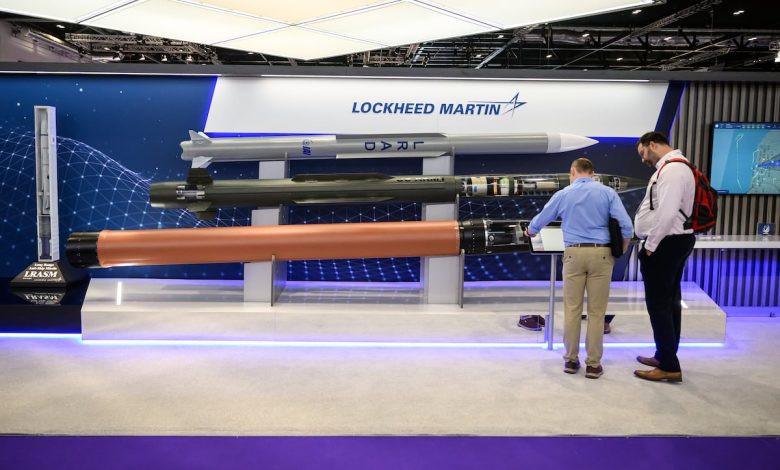The US must reform an arms sales process that invites dawdling

Last month, the State Department announced a record high in defense sales. When President Trump left office in 2021, defense sales totaled just over $175 billion. Defense exports saw an 81% increase from 2020 to 2024. If the second Trump administration wants to keep pace, it will have to re-think how it works with the various stakeholders to improve the timeline for delivery of weapons sales to our partners.
One important change is to partner with Congress to ensure that decisions on arms transfers are timely, sustainable and efficient.
In 2012, the State Department established a process, dubbed the “Tiered Review System,” whereby the State Department would “informally” preview prospective defense article transfers and licenses to the congressional committees of jurisdiction (Senate Foreign Relations Committee and House Foreign Affairs Committee) before initiating the formal notification that is required under the Arms Export Control Act.
This process is not statutory and is memorialized by an exchange of letters between Congress and the State Department, thereby allowing changes without having to pass a law. Both sides of the aisle have a specific amount of time – depending on the country – to ask questions and share views on the prospective sale. This process has also allowed for the identification of potential problems or challenges prior to the public announcement that accompanies “formal” notification. Hierarchical ranking of countries determines the review duration and cost for consideration, e.g., shorter review periods and higher cost thresholds for NATO countries.
This process was based on the belief that identifying and resolving potential problems prior to formal review and public notification could avoid a Joint Congressional Resolution of Disapproval of the sale, which would be harmful to the bilateral relationship and embarrassing for all stakeholders. Bipartisan buy-in for defense transfers – particularly transfers that take years to deliver – helps U.S. security cooperation partners have confidence that both political parties will support the transfer throughout the 20–30-year life cycle of the system.
Congress plays a vital role in foreign policy and in building our security relationships, and U.S. partners and industry need to see the signal from Congress of commitment to the longevity of the transfer. The Tiered Review process was meant to provide a mechanism to demonstrate that commitment.
In practice, the Tiered Review process has evolved into a way for a single member of Congress to exercise a veto over weapons sale or technology transfer for reasons that may not have anything to do with foreign or defense policy. Though the process was designed with expedience in mind, the end result has been complications and delays.
Congress is not receiving the information it needs; the defense industry is not receiving the certainty it needs; the executive branch is not receiving the efficiency it needs; and some security cooperation partners are not receiving the weapons they need.
Weapons sales that were meant to move forward in a month’s time have been stalled for years, resulting in frustration for all the U.S. stakeholders and our allies and partners. In a rapidly evolving global security environment, we can no longer afford to delay the transfer of military capabilities to our allies and partners. In their frustration, some may turn to our economic and security rivals.
The answer is not to just abandon the Tiered Review process, as some have suggested. Weapons sales are, at their core, a foreign policy tool, and members of Congress must have a role in shaping key elements of this policy. All stakeholders, U.S. and foreign, still need the certainty that comes from a supportive Congress. Completely abandoning the informal notification process would deprive the process of this essential support and is therefore unacceptable. That said, it is long past time to replace the current Tiered Review process with a new process that restores the working partnership between Congress, the executive branch, and the defense industrial base. We need a process that strengthens the confidence of our allies and partners and strikes a balance between due diligence and speed.
We believe our recommendations would help this process get back on track.
Under a new process, which we call the Arms Transfer and Export Review Series (ATER Series), the State Department would continue to preview potential transfers and licenses to Congressional committees of jurisdiction before formal notification. This process would continue to be informal in that it would not be written into law to allow for flexibility and changes. All requirements of the Arms Export Control Act would still apply.
For ATER Series 1 cases, (most NATO allies and our closest partners, as well as maintenance and sustainment cases for transfers that have already been adjudicated) the administration should be able to move more seamlessly through the process. The administration and Congress should work collaboratively to produce the exact list of countries in Series 1. The administration will send a weekly informal notification that these sales will be formally and publicly notified the following week. No formal clearance would be required before formal notification, but the Arms Export Control Act would still allow for congressional opposition via Joint Resolutions of Disapproval. This would also allow congressional staff and members of Congress the time to focus on more complicated cases.
For ATER Series 2 cases (most other countries), Congress would receive informal notification of transfers and would have 20 days to review before these transfers move ahead to formal notification. Once questions from a chairman or ranking member of the committee of jurisdiction are sent to the State Department, the review period should be paused while the executive formulates a response. Each chairman and ranking member would have one opportunity during the time period to ask questions, and then the review period would resume.
The 30-day clock could stop up to four times – once for each ranking member or chair to ask their questions. The review period could be a time when the committee and the executive branch share views on conditionality or leverage with respect to a certain transfer. The clock will resume once the executive branch responds to the question(s). This review period ensures that Congress is well informed and avoids the scenario of the executive violating a congressional “hold.” Once the review period has expired and the executive determines it wants to proceed with formal notification to the full Congress, a member of Congress can only seek to stop a sale through a Joint Resolution of Disapproval pursuant to the Arms Export Control Act.
ATER Series 3 would follow a similar method as Series 2; 30 days for review, with applicable pauses – but would also include the analysis for how the transfer would affect Israel’s Qualitative Military Edge, which is required by law. This will allow lawmakers to consider how transfers to the Middle East would impact Israel’s security, according to the law.
Security cooperation is one of the most important tools that the United States has to build alliances and partnerships, encourage burden sharing, increase interoperability, grow U.S. jobs, and protect U.S. competitiveness and technological superiority. Congress can and should play a key role in deciding how this tool is used in accordance with the law. That said, we must find the right balance between congressional due diligence and meeting the needs of our allies and partners in a timely fashion.
To that end, we should replace the current Tiered Review with a more transparent, predictable process that can serve the interests of all stakeholders and more rapidly advance U.S. security goals.
Charles Hooper is a retired U.S. Army lieutenant general and former director of the Defense Security Cooperation Agency. Mira Resnick is the former deputy assistant secretary of State for regional security in the Bureau of Political Military Affairs.
Read the full article here






